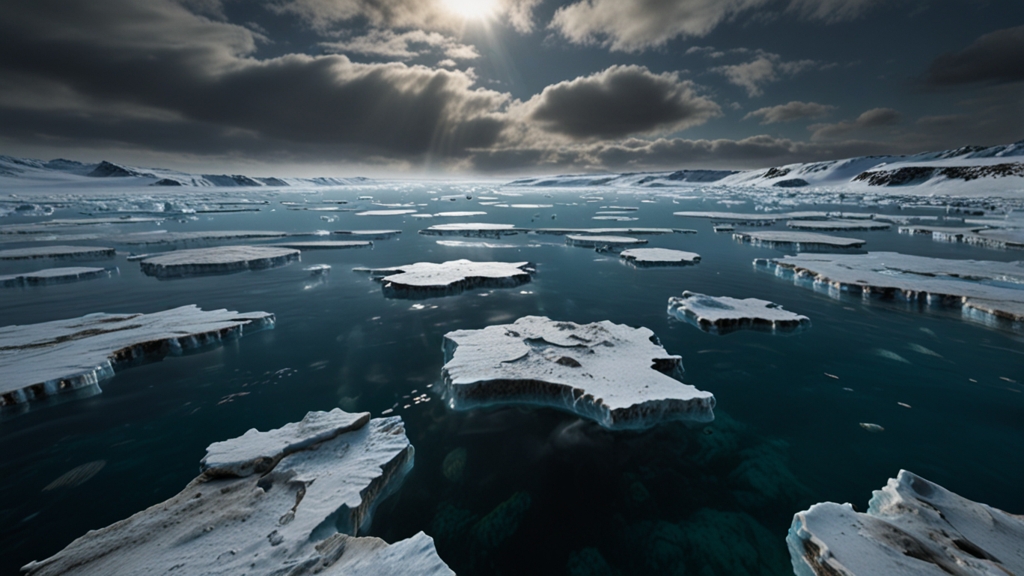Life Under the Ice: The Fascinating Research on Europa's Hidden Ocean
Europa, one of Jupiter’s most intriguing moons, has fascinated scientists for decades. What makes this celestial body so captivating is not its icy surface, but what lies beneath it—a vast, hidden ocean that could potentially harbor life. Recent missions and advancements in space exploration have provided valuable insights into this enigmatic world, making Europa a prime candidate in the search for extraterrestrial life.
The Icy Crust and Hidden Depths
Europa is slightly smaller than Earth's moon, but it holds a secret beneath its thick ice crust. Scientists believe that beneath its frozen exterior lies a subsurface ocean that contains more water than all of Earth’s oceans combined. This hidden ocean is kept in liquid form by the gravitational forces exerted by Jupiter, which create tidal heating within Europa’s core.
The potential for life in this hidden ocean stems from the conditions similar to those found in Earth's deep ocean ecosystems. Here on Earth, we have discovered life forms thriving around hydrothermal vents, where sunlight and photosynthesis are absent. These extremophiles rely on chemosynthesis, drawing energy from the chemical reactions between the water and the minerals in the Earth’s crust.
"Europa’s subsurface ocean is one of the most promising places to search for life beyond Earth," says Dr. Margaret Kivelson, a leading researcher in planetary science. "The combination of liquid water, heat, and potential chemical nutrients creates a tantalizing environment for life."
Scientific Missions and Discoveries
The scientific community has long been interested in unraveling Europa’s mysteries. Early images and data from the Galileo spacecraft in the 1990s provided compelling evidence of a subsurface ocean. More recent missions have focused on gathering detailed information about Europa's surface and its icy shell.
NASA’s upcoming Europa Clipper mission, scheduled to launch in the 2020s, aims to conduct close flybys of Europa, using sophisticated instruments to analyze its ice crust and the underlying ocean. The mission will deploy ice-penetrating radar to measure the thickness of the ice, a magnetometer to detect the salty ocean, and spectrometers to study the surface composition. These investigations will shed light on the moon's potential habitability and prepare for future missions that might directly sample the water.
"The Europa Clipper mission represents a pivotal step in our quest to determine if life exists beyond Earth," explains Dr. Thomas Zurbuchen, NASA's Associate Administrator for the Science Mission Directorate. "The data we collect will guide future exploratory missions and deepen our understanding of this icy world."
Pondering the Possibilities
The potential discovery of life on Europa would have profound implications for our understanding of biology and the possibilities of life elsewhere in the universe. It would suggest that life can develop in diverse environments and that the conditions necessary for life are not unique to Earth.
Scientists continually hypothesize about the types of life forms that could exist in Europa's ocean. These organisms could range from simple microbes to more complex multicellular life. The energy from tidal heating and possibly hydrothermal vents could sustain a diverse ecosystem, similar to those found in Earth’s oceans.
As we edge closer to uncovering the secrets of Europa’s hidden ocean, humanity’s quest to answer the age-old question—are we alone?—may soon be within our grasp. The studies and missions aimed at Europa not only hold the promise of discovering extraterrestrial life but also offer a deeper appreciation for the resilience of life under extreme conditions.
"The search for life on Europa transcends the pursuit of scientific knowledge; it is a journey that unites us in our shared curiosity and longing to understand our place in the cosmos," reflects Dr. Carl Johansen, astrobiologist and author.
Ultimately, the research on Europa’s hidden ocean stands as a testament to human ingenuity and our unyielding desire to explore the unknown. The discoveries awaiting beneath Europa’s icy shell promise to transform our understanding of life and the universe, making the small moon one of the most exciting frontiers in space exploration.











